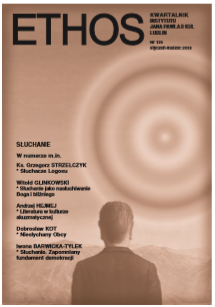Słuchanie jako nasłuchiwanie Boga i bliźniego.
- Glosa antropologicznofilozoficzna
Listening as Hearing God and Thy Neighbour - An Anthropological and Philosophical Gloss
Author(s): Witold P. GlinkowskiSubject(s): Christian Theology and Religion, Anthropology, Communication studies, Theology and Religion, Ancient Philosphy, Philosophy of Religion
Published by: Katolicki Uniwersytet Lubelski Jana Pawła II - Instytut Jana Pawła II, Wydział Filozofii
Keywords: listening, dialogical relation; person; freedom and responsibility;
Summary/Abstract: Since Plato, philosophy has been strengthening both its status and instrumentarium by reference to seeing rather than listening. Platonic ideas were seeable—not for the senses, but for the intellect—and thus their authenticity could be guaranteed on the basis of scientific knowledge (episteme) and not just as a common belief (doxa). This led, however, to the appropriation of the philosophical space, the subject (‘I’) becoming the superior instance and arbitrator of authenticity that laid the claim to express its opinions on the object (‘It’) and to verify any objective knowledge. In consequence, another subject would also have to become an object—one of many, even if doubtlessly specific. Such a subject was no longer capable of perceiving—within the realm of philosophical problems—anything which was neither a subject, i.e., mental substance (res cogitans), nor an object (res extensa). Therefore, anything that could not be classified into either of the two categories appropriating the philosophical reality had to disappear from the subject’s field of vision. However, philosophical thinking about man requires considering such categories as ‘human person’ or ‘neighbor.’ They cannot be ‘seen,’ even if we refer to intellectual abstraction, and yet ignoring them deprives the discourse on man of its credibility. The prerequisite to overcoming this inconvenience is to open oneself to ‘You’—not by seeing it, but hearing the call that ‘You’ sends towards ‘I.’
Journal: Ethos. Kwartalnik Instytutu Jana Pawła II KUL
- Issue Year: 32/2019
- Issue No: 1
- Page Range: 48-63
- Page Count: 16
- Language: Polish
- Content File-PDF

